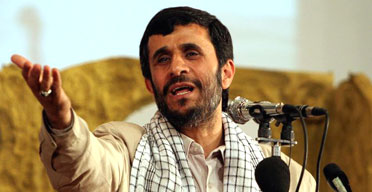 Davo over at Wombat's Waffles has published THE letter from Iran. You can read it there or here. Now there can be all sorts of views on the letter. Who are the Iranians to tell others what to do? Do the Iranians understand how the Americans think? Are the Iranians being sincere but naive?
Davo over at Wombat's Waffles has published THE letter from Iran. You can read it there or here. Now there can be all sorts of views on the letter. Who are the Iranians to tell others what to do? Do the Iranians understand how the Americans think? Are the Iranians being sincere but naive?Now turn that around, shall we? Who are the Americans to tell others what to do? Do the Americans understand how the Iranians think? Are the Americans being sincere but naive?
Now for the answers:
- Both Iran and the U.S. indulge in state-sponsored violence and incursions on the sovereignty of other nations.
- Both Iran and the U.S. need to have a greater objectivity about their history and their place in the world and among the nations. As Robert Burns said: O would some power the giftie gie us to see ourselves as others see us.
- Americans have some self-seeking and self-agrrandizing national myths which do not serve them well internationally. Perhaps, Iran does too. National myths without the objectivity of broad and deep knowledge can not only breed naivete when placed in a wider context but, without such objectivity, other dangers come: ignorance, bigotry, national superiority, notions about racial, ethnic, typological superiority.
George W. Bush professes Christ. Significant sectors of the American polity do too. It therefore behoves the President and all Americans to have a look at the theology of The Letter from Iran. There is much to think about. Equally, the Iranian President will need to be held to his spiritual ideals expressed in The Letter.
The Abrahamic religions do have common ground. The Abrahamaic heritage of the One God. A sense of justice. A sense of compassion. A demand for an ethical life. The facts are that so often governments operating within this heritage do not live out the ideals and demands of the heritage. We are not ignorant. Yet we build faultlines of bigotry, racism, and prejudice out of a common heritage. And then we complain when, into our self-built difficulties, comes another with a capacity to build the ultimate weapon of the current technology.
The Iranian President Mahmoud Ahmadinejad has outlined the basis for a closer relationship and for a common understanding. Whether the U.S. likes it or not and whether the Iranian President is genuine or using empty grandstanding rhetoric, the path has been shown which could lead to a bridge. Miss Eagle is reminded of what Maya Angelou once said that God sends pebbles into our lives. If we ignore them, he then sends a rock.
